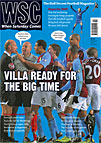 Simon Tyers is bemused at the football based talent show and bemoans the dumbing down of a national institution, BBCs Sports Personality of the Year
Simon Tyers is bemused at the football based talent show and bemoans the dumbing down of a national institution, BBCs Sports Personality of the Year
Top-class footballers have often been called upon to demonstrate their skills to the next generation down. This used to be mostly through cartoon-strip coaching advice in the weekly magazines. If a player became really famous he might be given 30 12-year-olds to instruct on television, as happened to George Best for one. It is therefore alarming, even accounting for progress and changing times, to discover that playing football in the street is now an extreme sport.
Such was the approach of Sky One’s Wayne Rooney’s Street Striker. Clare Tomlinson’s introductory voice-over, delivered with due gravitas, informed us that this was “a unique competition – a search for a natural, raw football talent”. This would be all well and good were natural, raw football talents not better exhibited by their skill on grass pitches and against opponents rather than, as here, volleying balls dropped from the seventh storey of a tower block into a skip. Indeed the whole layout suggested an advertising copywriter’s view of what constitutes a back street, or “a strictly controlled environment” as the don’t-try-this-at-home opening disclaimer put it.
The origins of this show surely lie in Sky Sports’ fondness for the showboating culture that has developed in modern football. But there is no pause for reflecting on why Cristiano Ronaldo took some time to add an end product to all his feints and turns. If you’re a 16-year-old who’s won through from the qualifying trials, either you should already be on the books of a Premier League team, or you’re not a football genius at all – you’re a ball juggler. There’s a good reason why the keepy-uppy world record-holder is one Martinho Eduardo Orige and not, say, Robinho.
Much has been made of Rooney’s unease in front of a camera, but he can’t be expected to turn instantly into Adrian Chiles. In any case, it’s clear he has a rapport with the initially awestruck contestants, especially when he requires several goes to succeed at the challenges himself, and he was clearly uncomfortable at having to tell certain contenders they wouldn’t be progressing any further. The real problem is that this isn’t about football at all. It’s just another showbusiness event in the neon-lit Sky One Sunday evening slot, with unsubtle sponsorship from Coke Zero.
Meanwhile, Southend fans may be interested to find that their former player Andy Ansah now calls himself a “football consultant and choreographer”, which is basically a fancy term for someone who gets people to look stylish while kicking a ball. As with other reality-television shows, the programme requires us to empathise with the contestants as much as enjoy what they’re doing, while also suggesting that “street football” is now an entity in itself, some sort of playground for show-offs. As Brooklyn, a 16-year-old girl, informed us, its strengths are “no offsides, no anything – it can be in a big area… it’s a lot about striking, about glory-hunting”.
But expensive light shows accompanied by pumping beats get to us all in the end. Not so long ago the BBC’s Sports Personality of the Year was titled Sports Review of the Year and followed an entirely sane and sensible path. Sportsmen would gather in a conference centre to watch a series of unfussy compilations of each major sport’s big moments, Des Lynam would indulge in light banter with high-profile names in the front row and at some point someone would be called on stage to wrestle with new technology in the name of five minutes’ entertainment.
This year, the cavernous Echo Arena in Liverpool played host to a series of films shot in art-house style, all fast cuts, fuzzy edits and unusual angles, with rarely any indication directly given of what the featured sportspeople had done to deserve such treatment. Even on a night that included Heather Small singing Proud again, as a reminder of how much we hated it both on release and when the 2012 Olympic campaign co-opted it, the lowest moment was reached when Gary Lineker announced an award would be presented by “two Liverpudlian heroes, Ian Rush and… Phil Neville”. Was Graeme Sharp ill? Earlier Lineker had claimed that “the Euros without the home nations was like Strictly Come Dancing without John Sergeant”. I don’t expect he meant to imply that the technical standard and entertainment value was higher as a result, but you never know.
From WSC 264 February 2009